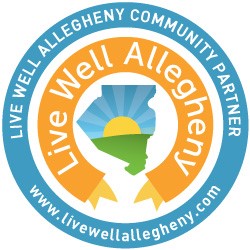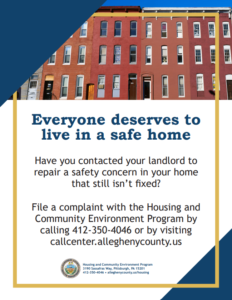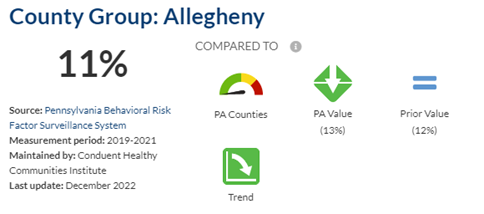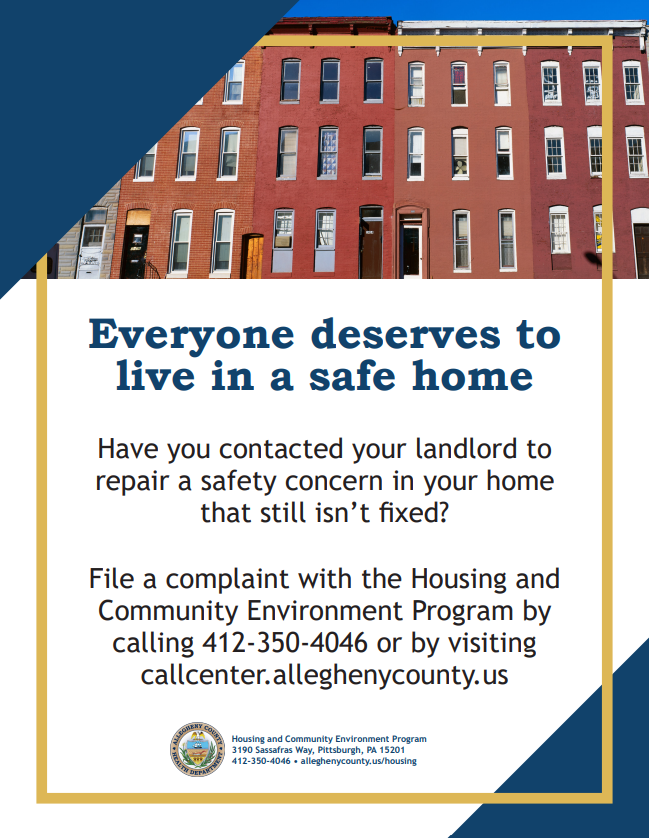Live Well Allegheny: January 2024 E-Update
Happy New Year!
More than 350 Live Well partners are united to make Allegheny County healthy for all to live, learn, work and play!
The Live Well Allegheny update contains information to help make Allegheny County a healthier place for all. Please feel free to share.
Be sure to follow the Allegheny County Health Department on Facebook, Twitter, and Instagram to stay up to date on all ACHD news.
Welcome New Live Well Partners!
We have a new community partner!
The Chronic Disease Health Alliance
The CDHA is a conglomerate of local organizations joined together to form a “super team” to provide resources and aid in the fight against chronic disease.
Their Mission: Bridging the gap in healthcare by providing low income and food scarce communities in Allegheny County with access to quality nutrition resources and education for the prevention, management, and reversal of chronic disease.
Check out their website for more information: CDHA (cdhapgh.org)
January Health Observance: Cervical Cancer
January is Cervical Cancer Awareness Month
At one time in the US, cervical cancer was a leading cause of cancer death for women and individuals with a cervix. Today, screening and prevention have immensely reduced the impact of cervical cancer. Read more about cervical cancer here.
Across the United States, thousands of people will be diagnosed in 2024 and as many as 4,000 may die Cervical Cancer Statistics | CDC. In Allegheny County, there are 6.4 cases per 100,000 people with a cervix. Due to social, environmental, and economic disadvantages, certain groups in the US bear a disproportionate burden of cancer than others. People of Color can experience disparities in the delivery of healthcare they receive, even in the same city or the same doctor’s office. Black/African American and Hispanic/Latino folks have higher rates of cervical cancer than all other racial/ethnic groups, with Black/African American people having the highest rate of death from the disease. The incidence rates of cervical cancers are also much higher in rural Appalachia than in urban areas of the same region Cancer Disparities – National Cancer Institute.
Encouraging regular screening and prevention tools are absolutely key to decreasing the rates of cervical cancer.
A Pap smear, also called a Pap test, is a procedure recommended for women and people with a cervix, usually beginning at age 21 and repeating every 3 years. It is possible that a doctor may recommend them with more frequency for a higher risk patient. This test collects biological samples from the cervix to identify changes or abnormalities in cervical cells and quickly detect potentially developing cancers. While many folks get these done at a gynecologist’s office, some Primary Care Physicians can conduct this test too. Check with a trusted health provider regarding where and when to get this done. Here are some places to check out in Allegheny County if you do not have a Primary Care Physician or Gynecologist:
- Federally Qualified Health Centers and Sliding Fee Clinics (Pages 2 and 3)
- Pittsburgh Family Planning Health Center
- Allies for Health and Wellbeing
- Adagio Health and the Department of Human Services can screen you to see if you are eligible for free Breast and Cervical Cancer tests. Click on the links or call 1-800-215-7494
Many cases of cervical cancer are caused by a human papillomavirus (HPV). Nearly half of all sexually active people will get HPV at some point in their lives. Getting vaccinated before one begins to engage in sexual activity can prevent a large majority of cases. 
The Allegheny County Health Department Immunization Clinic offers the HPV vaccine! Explore their web page on the county website for more information about available vaccines, how to make an appointment, and how to get in touch with them with any questions or concerns: Immunization Clinic – Allegheny County, PA.
Males can and should also get the HPV vaccine, as HPV can cause anal, oral, and penile cancers as well. The HPV vaccine is currently recommended around age 11 or 12, but check out this CDC page for more information, and to see how many doses are needed for each age range.
What Can I Do?
Live Well Communities can use trusted messengers to speak to their community about getting regular Pap smears and getting their children vaccinated for HPV. Please also share this information via any upcoming newsletters and social media posts. Check out these short, informative videos from the CDC that you can share online: Pediatricians Answer Questions About the HPV Vaccine | CDC.
Allegheny County Health Department Updates
Housing and Community Environment Program
The Housing and Community Environment Program (HCE), under the Allegheny County Health Department, works to keep housing and neighborhoods safe from public health and safety hazards.
Have you contacted your landlord about an issue in your home and nothing has been done? ACHD takes complaints, contacts the landlord, then offers to the resident at no cost, a full inspection for violations of our regulations. A report will be provided to the resident and landlord through the mail with information on follow up. Emergency situations such as sewage, lack of heat or other utilities will have a faster turn-around than other violations. It is important to note that contacting ACHD cannot be used as grounds for an eviction. ACHD inspectors are looking for anything that could result in a health or safety problem.
Do you have a neighbor not keeping their trash contained or otherwise drawing pests? We can take a complaint on that as well and contact them before going to inspect the outside of the property. Additionally, ACHD takes complaints about facilities like boarding homes, hotel/rooming houses, and public pools and bathing places. Everyone deserves to live in a safe and healthy environment, and we can help with that.
To report a concern, you can call 412-350-4046 or use the Allegheny County Self-Service Portal. Select Request Service/File Complaint, then select Health Department, and then select the Housing tab. ACHD cannot help until it knows about it!

Live Well, Be Well
Did You Know?
Giant Eagle has a Mobile Market that travels weekly to ten Pittsburgh-area communities that are experiencing issues with food access.
This Mobile Market contains over 700 grocery items including meat, dairy, frozen and dry goods. In addition, fresh produce is always sold at half price.
SNAP and WIC are also accepted.
Current locations include Sheraden, Larimer, Homewood, Mt. Oliver, Hazelwood, Glen-Hazel, Rankin, and Braddock. Check out the Mobile Market’s schedule here: Giant Eagle’s Mobile Market.
Are you fully protected?
Although the holidays may be behind us, it is not too late to get vaccinated for the most common viruses going around. Every winter, as people spend more hours indoors and may be attending more crowded indoor activities, rates of COVID-19, influenza, and respiratory syncytial virus (RSV) go up. You can prevent severe symptoms and hospitalization by getting up-to-date vaccines on each of these viruses.
Who should get the RSV vaccine?
At the moment, the CDC is recommending that adults 60 years and older get vaccinated for RSV, as well as pregnant people from week 32 to week 36 of pregnancy to protect their infants under 6 months of age. For other babies, it is possible to get preventative antibodies. Because we are past the peak of RSV season, most of the US stops giving the RSV vaccine after January, but talk to your doctor for further information, and please consider one for the fall of 2024.
PSA from Urban League of Greater Pittsburgh
Check out this PSA about COVID-19 vaccination and see some familiar faces from ACHD’s REACH coalition!
Video: PSA from Urban League of Greater Pittsburgh: COVID-19 Vaccination
Still Working from Home?
Physical activity breaks are a great way to relieve anxiety and help stay focused! Try going for a quick walk or doing yoga, push-ups, or squats between tasks. Learn more about the benefits of physical activity.
Good News about Tobacco Use Among Teens!
E-cigarettes are still the most commonly used tobacco product among youths. However, from 2022 to 2023, current e-cigarette use among high school students declined from 14.1% to 10.0%!
Continued public health monitoring and the implementation of evidence-based tobacco control strategies, including effective youth interventions, media campaigns, Food and Drug Administration (FDA) regulations, and other tobacco prevention policies might further reduce youth tobacco product use.
Keep up the good work, Live Well Communities!
Chronic Disease Spotlight
According to the CDC, six in ten adults in the U.S. have a chronic disease and four in ten adults have two or more chronic diseases Chronic Diseases in America | CDC. Each month this section will highlight a common chronic disease and provide educational resources.
Heart Disease and Cardiovascular Disease
How much do you know about heart disease? Take the quiz!: How Much Do You Know About Heart Disease?
Check out this Community Health Dashboard from the Health Department to explore local data on various heart health topics: Community Indicators and Health Data – Allegheny County, PA. You can type in phrases like heart disease, heart attack, high blood pressure, and many more. For example, the indicator shows that 11% of adults 35 years and older in Allegheny County have been told by a health care provider that they have had a heart attack, coronary heart disease, or a stroke. You can even search by your zip code!

Heart disease is a broad term for a number of different conditions that affect the heart’s functioning and blood flow, and it has been the leading cause of death in the US for many years. These conditions can include:
- Coronary artery disease
- Irregular heartbeats
- Disease of the heart muscle
- Heart valve disease
Read all about different heart conditions here: Heart Disease Symptoms and Causes – Mayo Clinic.
Watch this video from the Mayo Clinic explaining coronary artery disease: Mayo Clinic Explains Coronary Artery Disease
Many of the symptoms of these various conditions can overlap, so it is important to see a physician to determine what you are experiencing and the best course of treatment. Here are a few of the symptoms:
- Chest pain, pressure, or discomfort
- Dizziness
- Fatigue
- Lightheadedness
- Fast or slow heartbeat
- Easily tiring during activity
- Feeling shortness of breath
Many of the same lifestyle changes that are used to manage different heart diseases are also the same ones that can be used to prevent them in the first place! Here are some examples:
- Quit smoking
- Eat a diet low in salt and saturated fats
- Move your body for at least 30 minutes per day on most days of the week
- Maintain a healthy weight for YOU
- Reduce and manage stress and mental health
- Control high blood pressure, high cholesterol, and diabetes
- Get high quality sleep, and aim for 7 to 9 hours per night
Making small, manageable changes to any one of these can add up in a big way to improve your overall health!
The CDC created the “Live to the Beat” Campaign, which aims to reduce the risk of cardiovascular disease among Black adults ages 35-54. Check out their user-friendly materials and educational videos that can be shared on social media, or via email.

There are many things that our Live Well Allegheny Partners can do to support our mission for a healthier Allegheny County!
Live Well Restaurants can aid in the fight against heart disease by always including heart-healthy food options on their menus, labeling them as such, and bringing attention to them. This allows our residents and visitors to the county to continue having fun by eating out while staying heart healthy.
Live Well Schools can help our kids develop heart healthy habits from a young age by encouraging daily exercise and educating our kids about healthy food options and maintaining a good balance throughout the lifespan. They can also support parents with resources, cooking demonstrations, and family-oriented physical activity events.
Live Well Workplaces can provide healthier food options at meetings and events, encourage and leave time for walks during the workday, encourage using the stairs, provide ample resources for managing work stress, and make sure employees are taking time off to rest.
Live Well Municipalities can share this E-Update, any of the resources in this CDC Communications Kit, and host events such as healthy cooking demonstrations, community walks or 5ks, and improving the built environment to allow residents to more safely and easily walk around their neighborhood. Explore the Community Health Indicators tool from the Health Department to see how your zip code is faring with heart health and empower your community with this knowledge.

